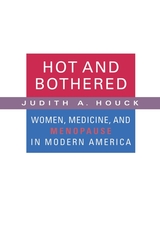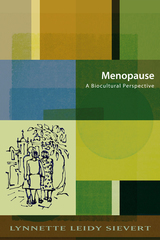
* Antibiotics and Resistance: the science, the policy debates, and perspectives from a microbiologist, a veterinarian, and an M.D.
* Genetically Modified Maize and Gene Flow: the science of genetic modification, protecting genetic diversity, agricultural biotech vesus the environment, corporate patents versus farmers' rights
* Hormone Replacement Theory and Menopause: overview of the Women's Health Initiative, history of hormone replacement therapy, the medicalization of menopause, hormone replacement therapy and clinical trials
* Smallpox: historical and medical overview of smallpox, government policies for public health, the Emergency Health Powers Act, public resistance vs. cooperation.

How did menopause change from being a natural (and often welcome) end to a woman's childbearing years to a deficiency disease in need of medical and pharmacological intervention? As she traces the medicalization of menopause over the last 100 years, historian Judith Houck challenges some widely held assumptions. Physicians hardly foisted hormones on reluctant female patients; rather, physicians themselves were often reluctant to claim menopause as a medical problem and resisted the widespread use of hormone therapy for what was, after all, a normal transition in a woman's lifespan. Houck argues that the medical and popular understandings of menopause at any given time depended on both pharmacological options and cultural ideas and anxieties of the moment. As women delayed marriage and motherhood and entered the workforce in greater numbers, the medical understanding, cultural meaning, and experience of menopause changed. By examining the history of menopause over the course of the twentieth century, Houck shows how the experience and representation of menopause has been profoundly influenced by biomedical developments and by changing roles for women and the changing definition of womanhood.

Menopause is a biological reality for all women in their forties and fifties. Yet the way we think about the cessation of menstruation is influenced by a variety of factors. Cultural and technological influences combine with biology to transform this universal phenomenon into an experience that varies considerably between cultures and individuals. In this concise book, Lynnette Leidy Sievert draws on her own case studies from Puebla, Mexico, and western Massachusetts, as well as on comparative data from other studies in places such as Slovenia, Paraguay, and Hawaii, to explore the different ways that women experience menopause around the world. Sievert suggests that attempts by medical professionals to define the “normal” occurrence of menopause, including its typical onset and symptoms, may not be realistic when considering how lifestyle, nutrition, and workload can contribute to diverging realities. She explores how women feel about hysterectomies, chemotherapy, and other medical procedures and treatments that stop menstruation prematurely. She also considers recent advances in technology, including post-menopausal birth, which have turned what was previously an unavoidable end of fertility into something that can be postponed.
A unique comparative look at women’s experiences, this text brings new perspectives to the mainstream literature on the subject and invites readers to consider compelling questions about menopause, its meanings, and its future.
READERS
Browse our collection.
PUBLISHERS
See BiblioVault's publisher services.
STUDENT SERVICES
Files for college accessibility offices.
UChicago Accessibility Resources
home | accessibility | search | about | contact us
BiblioVault ® 2001 - 2024
The University of Chicago Press









